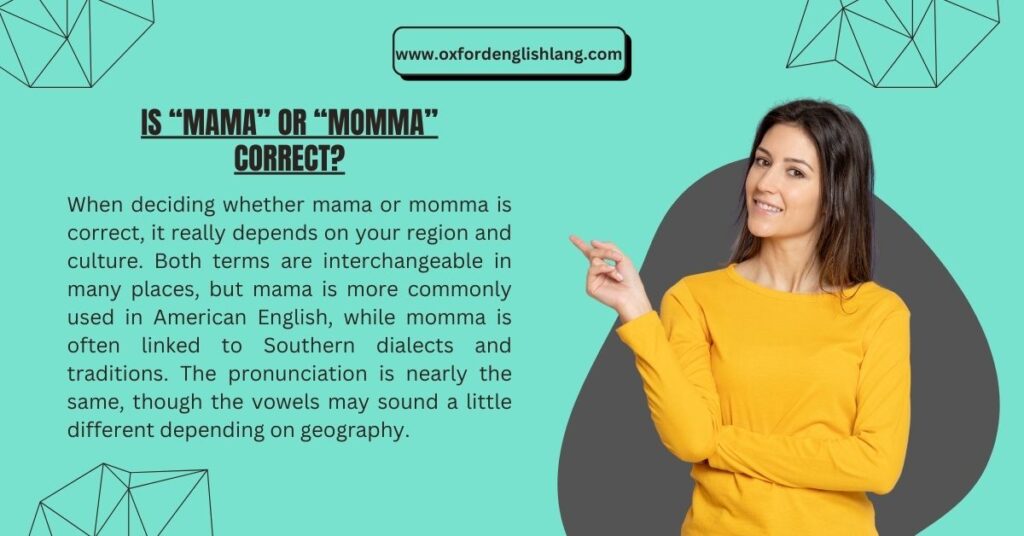When it comes to choosing between momma and mama, both are widely accepted and carry the same emotional and cultural weight. These words are informal ways to refer to a mother, often used with warmth and love. While the spelling and pronunciation differ slightly, the choice often depends on regional or personal preference.
For instance, “momma” is more commonly used in American English, while “mama” is favored in British English and other English-speaking regions.
Both terms hold a special place in family traditions and evoke a deep connection to cultural and regional norms. Whether you’re writing an article, having a heartfelt conversation, or simply trying to avoid confusion, it’s important to stay consistent in your usage.
The variants may reflect differences in geography and dialects, but they all express the same love and affection. Embracing these terms in your language adds a touch of informal charm that transcends borders.
“Momma” or “Mama”: Which One is Correct?
The choice between mama and momma depends on personal preference and regional norms. While momma is tied to Southern dialects and feels homey, mama is more versatile, used across both British and American English. Both are informal diminutives of mother, with slight spelling differences reflecting cultural and family significance.
Is “Mama” or “Momma” correct?

When deciding whether mama or momma is correct, it really depends on your region and culture. Both terms are interchangeable in many places, but mama is more commonly used in American English, while momma is often linked to Southern dialects and traditions. The pronunciation is nearly the same, though the vowels may sound a little different depending on geography.
For example, in California, you might hear both versions pronounced with a neutral tone, while in other areas, there may be a slight emphasis on the long a sound. Regardless of the version, both are widely understood as informal shortened versions of mother.
You Might also like: Too Cute Vs To Cute ( Too vs To ) Difference
Difference between “Momma” and “Mama”
The words “momma” and “mama” are both used to refer to a mother, but they carry subtle differences.
“Mama” is the original spelling and dates back to the 1500s. It is widely used across the world and is often associated with a more universal, informal term for mother.
On the other hand, “momma” is a variant that became popular in the 1800s, particularly in American English. While both are informal, “momma” is often linked to Southern culture, and it carries a warm, homey vibe.
The main difference between the two terms lies in their cultural and regional associations. “Mama” is more commonly used in the United Kingdom and other parts of the world, making it a more universal term.
It is also a bit more neutral in tone. In contrast, “momma” has strong ties to Southern traditions and is often used to convey a sense of affection and comfort. In the United States, “momma” might be preferred in certain regions, especially in the South, due to its cultural significance.
Both words are interchangeable in many contexts, but they carry different connotations based on the geography and family traditions of the speaker.
For example, in California, the pronunciation of both terms might be the same, but “mama” is more common in Hispanic families, while “momma” is used more often by Anglo or European immigrant families. Both are affectionate terms, but the tone and warmth of “momma” can feel more authentic in certain Southern households.
How to Use “Mama” and “Momma” in Writing
When using mama or momma in writing, make sure to keep the tone and context in mind. Both terms can express endearment and respect, but they work differently depending on the emotional or cultural setting.
For example, in Southern-themed storytelling, momma often adds a warm, authentic feel, while mama is more versatile and can be used in formal or generic contexts.
Remember, if you’re referring to someone by name, both words should be capitalized as a proper noun, but you don’t need to capitalize them when describing a general parental relationship. Always ensure that your usage is consistent throughout, and choose the version that best fits the relationship you’re conveying to your reader.
You Might also like: Moment Vs Momment: which one is correct?
Which spelling should you use?
When deciding between mama and momma, it really depends on your personal preference or what your mother prefers. The pronunciation and spelling of the word can vary based on where you were born and raised, so there’s no one-size-fits-all answer.
If you’re writing for a broader audience that may be unfamiliar with Southern dialects, it’s usually safer to go with mama. However, if you’re going for a more intimate, nostalgic, or regional feel, then momma is a heartfelt choice.
You can use either spelling in different contexts, like when sharing a family reunion or asking about a recipe for roasted vegetables. Just make sure to be consistent in your choice throughout your writing.
Related Words
In various regions, different versions of the word mother are used, influenced by local pronunciation and spelling. For instance, in the United Kingdom, Australia, and New Zealand, mum and Mummy are the popular terms, while in Canada, the term maman is commonly used in French-speaking areas like Quebec.
Though these words vary, they all carry the same meaning as mama and momma. The difference lies mainly in spelling and regional preferences.
For example, while mom and mommy are more common in North America, the British English version favors mum and Mummy, with slight variations in pronunciation.
Momma in Literature
In literature, the term momma is often used to evoke the deep emotional bond between mother and child. In To Kill a Mockingbird, Harper Lee uses momma to highlight family relationships and the nurturing role of mothers.
Scout and Jem reflect on their mother, Jean Louise Finch, showing how the presence of a mother shapes memories and emotions.
In The Color Purple, Celie writes letters to God, often mentioning her momma, reflecting on the absence of her mother and the profound impact it had on her life. This absence and the struggles it caused are key to understanding Celie’s character and her views on family.
In Beloved, Toni Morrison uses momma to explore the complexities of motherhood. Sethe’s bond with her deceased momma shapes much of her actions throughout the novel, emphasizing the emotional depth of the mother-child relationship.
Lastly, in Mama Day, Gloria Naylor presents Miranda, a matriarch who represents family, tradition, and generations. The term momma in this novel symbolizes the wisdom passed down through the ages, connecting the present to the past with strong emotional ties.
You Might also like: Align To or Align With: Which is Correct?
Suggestions for using momma and mama in a sentence with Examples
The terms “momma” and “mama” are both casual ways to refer to one’s mother. The decision to use one over the other typically comes down to personal choice or regional differences. Here are some suggestions for using “momma” and “mama” in sentences::
- Momma, I feel so loved when you give me a warm hug after a long day.
- I miss being at home with you, momma, especially when I’m away at school.
- Momma, thank you for always being there to help me with my homework and feel better when I’m stressed.
- Mama, your support is like a rock, and I’m grateful for all the sacrifices you’ve made for our family.
- I can’t wait to see you this weekend, momma, and spend the day at the park with you.
- You are my hero, momma, and I’m so proud to have you in my life.
- Mama, you always know how to make the best chocolate cake and teach me how to bake.
- Momma, you are the glue that keeps our family together, and I love you to the moon and back.
Frequently asked questions
Do you spell mama or momma?
Both spellings are correct, with “mama” being the more widely used version, while “momma” is a regional variant.
How do Southerners spell momma?
In the Southern United States, “momma” is the preferred spelling, reflecting a regional custom.
Is it baby mama or momma?
The correct spelling is “baby mama,” which informally refers to the mother of one’s child.
What is the difference between “momma” and “mama”?
“Momma” tends to have a more regional and casual feel, while “mama” is more universal and commonly used.
Are “momma” and “mama” considered formal or informal language?
Both are informal, affectionate terms used to refer to one’s mother.
How do British people say mama?
In British English, the term “mum” is commonly used instead of “mama” to refer to one’s mother. The pronunciation is typically “muhm,” and it is the standard term for mothers in the UK.

david Miller is an experienced English language expert with a deep passion for helping others communicate effectively and confidently. With a background in linguistics and literature, He provides clear, accessible insights on grammar, writing, and communication strategies. Through well-researched articles and practical advice, David Miller aims to make language learning both inspiring and achievable for readers of all levels.


